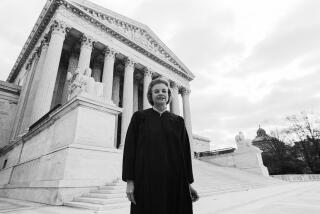O’Connor Cleared of Defamation
A jury unanimously found Friday that actor Carroll O’Connor did not defame his son’s “cocaine connection,” ending an emotion-packed civil court trial that blended fame, tragedy and freedom of speech.
After deliberating about six hours over two days, the six men and six women underscored with their verdicts the grieving father’s right to publicly expose his dead son’s drug supplier.
O’Connor sighed with relief and smiled slightly as the jury found that he had not ruined the reputation of Harry Perzigian by calling him “a partner in murder.”
Jurors later said they agreed with O’Connor and thought his comments were appropriate. Perzigian has been convicted of supplying cocaine to 32-year-old Hugh O’Connor, an addict who shot himself to death during a binge in March 1995.
“Personally, I see him as a lawbreaker,” juror Ernest Haro, 46, said of Perzigian. “I tried to put myself in the position of Carroll O’Connor. I have four sons of my own, and I probably would have done what he’d done--or worse.”
O’Connor, who for more than a dozen years portrayed the crusty bigot Archie Bunker on TV’s “All in the Family,” emotionally thanked half a dozen jurors, walking in on their news conference.
“You did a great job,” he told them. “I knew a jury wasn’t going to say I was wrong. I knew a jury would back me up, and you did. I’m very, very grateful.”
The jury’s decision dropped the curtain on a two-week trial that Los Angeles Superior Court Judge Malcolm H. Mackey said “fit the bill” for courtroom drama. “It has drugs, Hollywood, suicide, the 1st Amendment and freedom of speech,” Mackey said in dismissing the jurors.
*
O’Connor vowed to continue his crusade against people who supply drugs. “The jury said I could. The jury’s the boss,” he said. Later, his eyes brimming during a quiet moment, he said, softly, “My poor Hugh.”
The 72-year-old actor said he was surprised that the verdict was unanimous.
“Some of the things I said, although I always felt they were just, they were pretty strong,” he acknowledged. “I would not have been surprised if a couple of jurors thought, ‘Well, you went over the top on that one.’ ”
O’Connor’s lawyer, Lucy Inman, called the jury’s decision “a tremendous victory for free speech in this country.” Only nine jurors would have needed to agree for O’Connor to be cleared of liability, but the vote was unanimous on every question they considered.
Perzigian, a 41-year-old musician, said the decision showed that “L.A. loves celebrities. You’re not going to get a fair shake in L.A. if you sue a celebrity.”
His lawyer, Allan A. Sigel, said, “It only establishes once more that Los Angeles loves its celebrities. They mix the character with the person. And Harry here’s a victim of that adulation for Carroll O’Connor.”
*
Jurors denied that O’Connor’s fame played any role in their deliberations.
Douglas E. Mirell, a Los Angeles attorney who specializes in libel and free-speech issues, said the case carried a different lesson.
“It’s difficult to conceive of a case in which a convicted felon has a reputation that is capable of being resuscitated by means of a defamation suit,” he said. “Given the relatively high profile this one had, I would hope it would chill future frivolous litigation of this type.”
What began as a trial to determine whether O’Connor damaged Perzigian’s reputation with harsh words became, by its end, the soap box from which the well-known actor waged his anti-drug crusade before a national audience.
The actor said his battle against the evils of drug dealers has become “a very important outlet” for his grief. O’Connor has helped persuade legislators in three states to enact measures allowing victims to sue drug dealers and seize their assets. In Florida, the law is known as the Hugh O’Connor Memorial Law.
The trial continued a long ordeal for Hugh O’Connor’s widow.
“It felt tortuous,” said Angela O’Connor, the mother of the couple’s 4-year-old son, Sean Carroll O’Connor.
“I had to relive my husband’s death over and over,” she said. “It was outrageous and hurtful.”
*
Carroll O’Connor’s wife, Nancy, said there were some benefits. The trial, she said, raised her son’s memory as “a gifted, talented, adorable man who was also addicted.” And, she added, “I think we had a chance to do something to reveal the wickedness of drugs.”
Hugh O’Connor’s suicide on March 28, 1995, ended a battle with drug addiction that consumed half his life. On that night, his father stood before television cameras and condemned Perzigian for supplying drugs to his son.
Perzigian sued O’Connor for slander and infliction of emotional distress after the actor held his photograph in front of the cameras and branded him a drug dealer responsible for the death of his son.
Police, who had been investigating Perzigian at the elder O’Connor’s insistence, arrested him the day after the suicide. He was convicted last year of supplying--but not selling--cocaine to the younger O’Connor, who starred with his father for eight years in the detective drama “In the Heat of the Night.”
Perzigian sought $10 million in damages from O’Connor, but by the trial’s end indicated he would settle for a public apology. None was forthcoming.
*
During closing arguments Wednesday, O’Connor’s attorney argued that Perzigian didn’t deserve a dollar, while Perzigian’s attorney said his client had been defamed and deserved vindication, if not money.
Arguing on behalf of O’Connor, Inman told jurors that even if they awarded Perzigian the lowly sum of $1, it would deepen the tragedy that broke her client’s heart.
“It would be a defeat for every parent and citizen in this country,” Inman said. “A verdict of even $1 would reward a criminal and silence victims.”
Mirell, the free speech expert, said the notion that a grieving father could be sued by his son’s convicted drug source was “horrendously offensive.”
Some of the jurors agreed.
“For the drug supplier to turn around and sue the father of the guy who he was selling drugs to is just outrageous,” said Leticia Alcayaga, 29, a legal secretary with the federal public defender’s office.
*
During the trial, O’Connor asserted that he did not regret making the statements, but that they were not meant to be taken literally. “Anybody who deals deadly substances to addicts, causing the death of addicts, is a partner in that addict’s murder,” O’Connor testified. “How could I have meant that literally when Hugh committed suicide?”
He also battled tears on the witness stand as he recalled his first thoughts upon hearing of his son’s death: “It’s finally happened, everything I’ve always feared.”
On the stand, where his speech was protected from libel or slander actions, O’Connor freely referred to Perzigian as a “pusher” and drug dealer.
In his instructions to jurors Thursday, Mackey said that for Perzigian to prevail they must determine whether the actor’s conduct was “so vile, base, wretched and loathsome, it would be looked down on by ordinary people.”
In addition to deciding whether O’Connor’s comments were defamatory, the jurors’ task included determining whether Perzigian suffered mental anguish and whether the reputation of a convicted felon could be tarnished.
*
But the key question that jurors were instructed to consider was whether O’Connor was stating fact or opinion. To this end, much of the defense’s testimony was directed at painting the plaintiff as a criminal.
Inman told jurors Perzigian was Hugh O’Connor’s “cocaine connection” in Los Angeles and said his protestations that he was not a dealer “insult the intelligence of everyone in this courtroom.”
But in his closing argument, Perzigian’s attorney insisted that his client never profited from furnishing Hugh O’Connor with cocaine. Instead, he said, Perzigian shared with him as a friend.
O’Connor got in the last word. Buoyed by the verdict, he spoke out with the same vigor that resulted in the lawsuit against him. He sent a personal “message” to Perzigian who, O’Connor had publicly suggested, might not be paying his income taxes:
“Harry, pay your taxes and behave yourself.”
And he paused to remember his lost son:
“I want him to be remembered as a nice kid, a good actor, a handsome guy who had a big career ahead of him.”
(BEGIN TEXT OF INFOBOX / INFOGRAPHIC)
Questions Put to the Jury
Here are the items on the two jury verdict forms in the Carol O’Connor slander trial. The jury’s unanimous response was “no” in every instance.
Jury Verdict Form for Claim of Slander
Question 1: Were any of the following statements made by Carroll O’Connor about Harry Perzigian defamatory?
A. “This guy’s a lawbreaker who caused the death of a helpless addict.”
B. “He’s a partner in murder, not an accessory. A partner in murder.”
C. “He used to make deliveries to my son in this neighborhood and he’s as responsible for Hugh’s death as anybody on earth.”
D. “He supplied Hugh with cocaine, morphine, probably heroin, when he knew very well the condition that Hugh was in. He didn’t give a damn. That was his trade.”
E. “Where did this guy pay income tax last year? Where did he file a return? What company, what legitimate company is withholding taxes from him? Let’s get into this and find out. I say a guy who is feloniously selling drugs is feloniously doing other things.”
Jury Verdict Form for Claim of Intentional
Infliction of Emotional Distress
Question 1: Did Carroll O’Connor engage in outrageous conduct by:
A. Stating publicly, “I want to see you some day, Harry. I hope you come and see me.”
B. Stating publicly, “We all know what we have to do. We have to get rid of this menace.”
C. Stating publicly, “Now we have to get rid of the Harry Perzigians.”
D. Stating publicly, “Harry Perzigian, I want to see you some day, Harry. I’m looking to see you someday, Harry. I hope you come and see me.”
E. Stating publicly, “I have every--I want to harm him in the worst way in the world. Certainly, I want to harm him. He deserves harm.”
F. Obtaining a photograph of Harry Perzigian from a police officer and then showing that photograph publicly and stating, “How did you see him looking when he came in today. This is the man who wants to sue me for defamation of character. Look at this character. Have you got this pig.”
G. Carroll O’Connor stating to Don Crutchfield, “I just said to Hugh, how about if I just get my 9-millimeter and I go over and just shoot Harry in the face, how does that sound?”
H. Stating publicly the city and neighborhood where Harry Perzigian lives.
More to Read
Sign up for Essential California
The most important California stories and recommendations in your inbox every morning.
You may occasionally receive promotional content from the Los Angeles Times.










